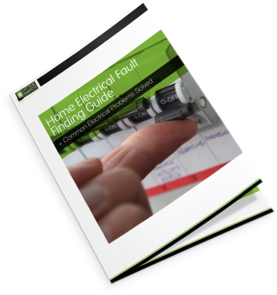Call 1300 205 205
Latest News
Talk to us at a time that suits you
Save the hassle and let us call you to book in a quote.
Talk to us at a time that suits you
Save the hassle and let us call you to book in a quote.

A No-Nonsense Guide to Improve Your Home Security
A house isn’t just an investment property. It’s so much more. A home. A safe, comfortable haven for your family. A place where memories will be made and cherished. A home is a part of the family. So we understand why you want to protect it – and those within it. Home security […]

A house isn’t just an investment property. It’s so much more. A home. A safe, comfortable haven for your family. A place where memories will be made and cherished.
A home is a part of the family. So we understand why you want to protect it - and those within it.
Home security involves everything from ensuring you have safe equipment to creating deterrents to theft.
In this guide, we cover it all. We look at how you can ensure your home is safe, strong, and welcoming shelter for all who come into it. And we make sure it stays safe even when nobody is home.
- Creating a Safer Home
- Home Security Tips for Your Doors
- Home Security Tips for Your Windows
- External Home Security
- A Complete Guide to Home Security Systems
- Smart Homes: The Future of Home Security
Home Security & Safety: Creating a Safer Home for All
Before we get in depth about protecting your home against others, we want to mention the importance of having a home built for safety. This comes down to safe building design, construction, maintenance, and fittings.
Safety in the home can be as simple as putting down non-slip floor mats or having soft, rounded edges on furniture.
But some things in the home may pose a greater problem. For example, older homes with porcelain fuses or with old porcelain fuse boxes for switchboards can pose a risk of faults, fluctuations, or even fire.
These homes may need rewiring or a switchboard upgrade. Both of those activities are best left to a professional.
Contact Hit The Switch and arrange an electrical safety inspection of your home today.
A safer home also has surge protectors to prevent damage from severe power surges, smoke alarms with working batteries, and general maintenance and repairs to guarantee safe wiring throughout.
And that’s before we even get onto the topic of a high-quality home security system to prevent theft.
Recommended reading: The Australian Government’s Your Home website gives a brilliant overview of safety and security in the home.
Home Security Tips & Tricks to Guard Your Property
Now that we’ve got home safety out the way, it’s time to get onto the momentous task of guarding your home against intruders.
An easy way to start is to think like a burglar. No, we’re not calling you to criminality. Just head out onto the road, look back at your home, and ask yourself: how could I rob this joint?
This exercise will help you discover the weaknesses in your home security setup, but if you need a little more prompting, here are the various aspects to consider...
Home Security for Your Doors
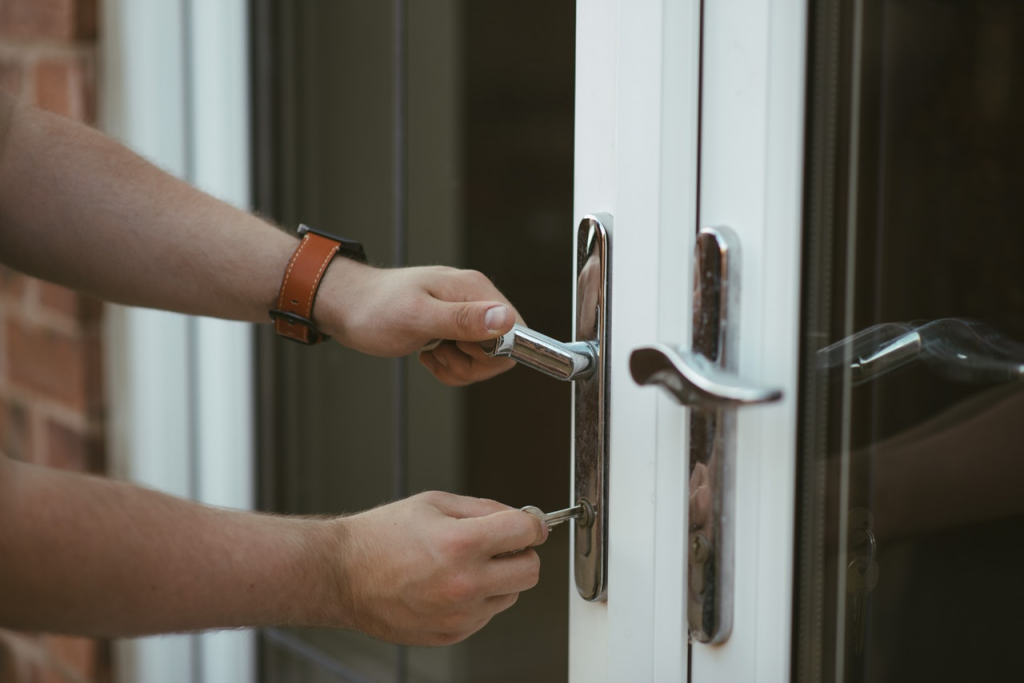
A few things you can do to protect your doors include:
- Ensuring the door frames are strong
- Ensuring the hinges are protected
- Boosting security with a front door video doorbell
- Reinforcing your door jamb with a heavy steel strike plate
- Adding an aluminium screen door
Now let’s talk locks. The best locks in Australia comply with an Australian Standard triple locking system and are tested against the Australian Lock Standard AS4145.2:1993.
Heavy-duty locks with modern designs are best. These might include deadlocks (locked with a key), deadlatches (self-locking), and deadbolts. The last is perfect as a second lock if you have a keyhole within your door knob.
Smart locks are the ultimate upgrade (and we might add, they’re awesome). For more on those, jump straight to our section on The Future of Home Security.
Recommended reading: This great article by Robinson’s Locksmiths outlines the three things to look for in your locks, according to Aussie standards.
Don’t forget about your sliding doors!
We love them in summer, but so many people forget about sliding doors when it comes to home security. They can be a big weak point.
You can fortify sliding doors by adding a door sensor or glass break sensor, which will alert you if your glass doors are tampered with. Key-operated locks or patio bolts will also help strengthen your sliding doors.
A budget-friendly option is to keep a wood or metal dowel in the sliding track so your door can’t be forced open.
Home Security for Your Windows
Aside from doors, windows are the second most obvious way for burglars to enter your home.
In a recent study of detained burglars,
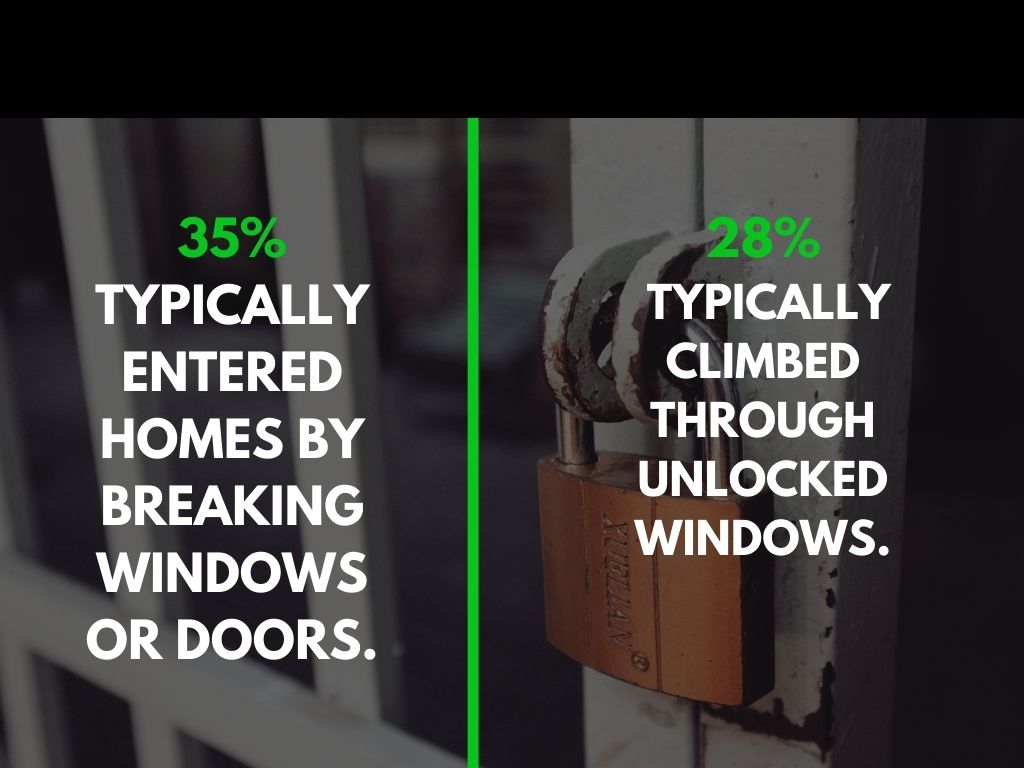
Even if your windows are closed, their latches can be flimsy. Glass can be smashed. But these methods are great ways to deter would-be intruders:
- Reinforce glass with window security film or double-glazing.
- Install window or glass break sensors.
- Add window bars or security screens.
- Install locks or key-operated levers.
- Install stops to prevent windows from opening too widely.
- Consider automated shutters that close for longer periods.
A simple non-tech option is to grow prickly plants under your first floor windows. An easy, budget deterrent. Nice-looking too.
External Home Security
You can design your block to act as a natural deterrent or an added layer of security for your home. Burglars might see your gate, fence, or high hedges and put your home in the too-hard basket. Outdoors floodlights or obvious home security measures could spook them. These might include:
- Installing motion-activated lights near your front and back doors.
- Placing lights along paths and near your garage, operated on a timer.
- Putting away ladders and locking garden sheds.
- Adding security signs and stickers if you have a home security system, a guard dog, or are part of neighbourhood watch.
- Removing trees close to windows.
Make sure any exterior lighting is switched on and off either on a timer, through motion sensors, or through a smartphone.
Keep Your Garage Secure
As another entry point into your home, your garage needs as much home security as your doors and windows.
It’s always important to lock all garage doors - interior and exterior. Upgrade to home automation or a smart garage door opener so your door is never left open. And be sure to cover your windows so peeping toms can’t see your Porsche.
Are you going away on holiday?

Here’s a little checklist before you head off:
- Test your alarm system, checking for blind spots your security cameras can’t access. You might need to trim hedges or reposition the cameras slightly.
- Hide your valuables in places even you will struggle to remember (in a box of tampons, in your box of washing detergent, etc).
- Ask the post office and newspaper to hold your deliveries. Or get a neighbour to collect your mail.
- If you’re away for an extended period, ask someone to housesit.
- Don’t share your travel plans on social media (even though it’s tempting).
Take Your Home Security to the Next Level
A home security system can be simple or complex. Budget or no expense spared. A simple security camera or full-blown home automation. Whatever it is, it will add another layer of protection for your home.
And because it’s a big topic, we’re going to dedicate a whole section on it below.
Recommended reading:
- BuzzFeed delivers 18 great budget home security hacks.
- Rent.com.au provides handy tips on keeping your rental home secure.
- Bunnings has provided some DIY home security tips.
- Real Estate View looks at home security from a new homeowner’s perspective.
- Lockmart provides dead simple and frankly obvious, but often overlooked, home security ideas.
- The Australian Police have provided their own tips and tricks for protecting your home.
- Citiguard wraps up all their home security tips in this neat infographic
- RACV weighs in with their own home security advice.
- Compare the Market provides some valuable insights to help you know the most effective methods of home protection.
- Find out more about the Neighbourhood Watch Program.
Everything You Ought to Know About Home Security Systems
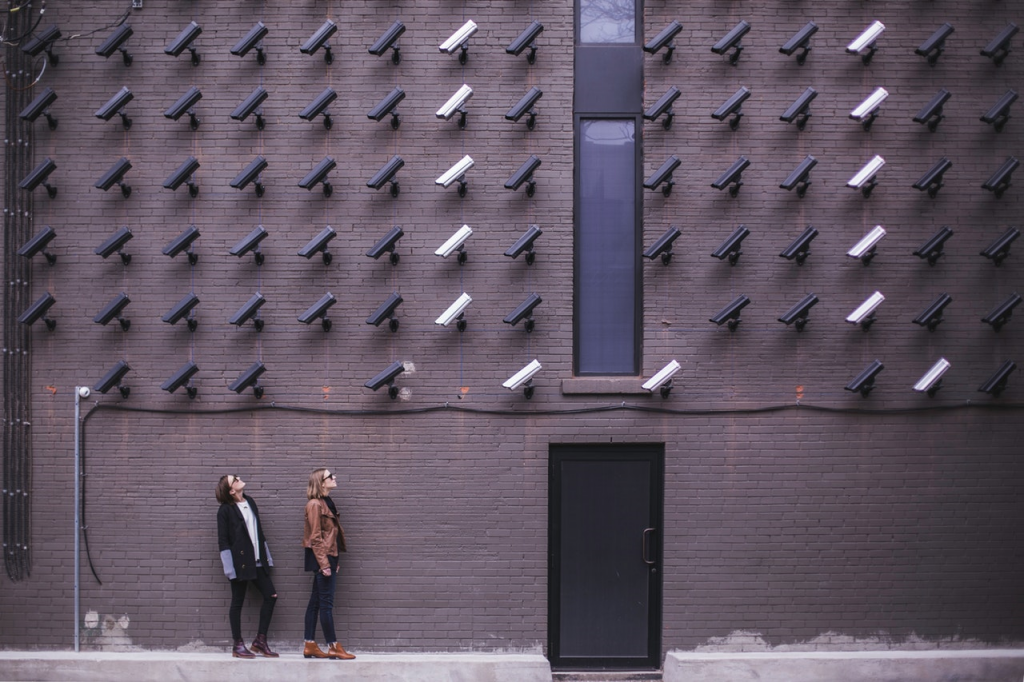
A home security system is a holistic system of technologies designed to fortify your home against unwelcome intruders.
Your classic home security system might include:
- A control panel, attached to your wall with a password-protected touchpad for you to disarm the system.
- Window and door sensors that alert the system when a door or window is opened.
- Motion sensors that trigger an alarm if they detect motion around your home.
- Optional security cameras (CCTV), which you can watch from your computer or smartphone to record blind spots.
- A high-decibel alarm, loud enough to frighten away intruders and alert neighbours.
In general, the best home security systems have motion detection and night vision capabilities, as well as weatherproof casings. Modern systems can connect to Wi-Fi.
Recommended reading: Choice gives a great rundown of the essential features you’ll need in your home security cameras.
How Do Home Security Systems Work?
Home security systems use sensors to detect unauthorised entry into your home. Some sound an alarm, which may alert a security company or the local authorities.
These services might:
- Phone you to verify any potential cause for the alarm.
- Send a guard around to check on your home.
- Contact emergency services for a response.
Alternatively, thanks to new innovative technology, an alert may be sent to your smartphone. With that one nifty device, you can view real-time footage, alert the police, and store the footage if needed.
Are Home Security Systems Worth It?
Instead of convincing you why home security systems are important, we’re going to argue the case with facts. Do you think an alarm system is worth it?
- 200,000 burglaries are recorded annually in Australia.
- Each incident costs the homeowner almost $3000.
- 60% of attempted burglaries on homes with security systems were unsuccessful.
- 20% of burgled houses are broken into more than once.
- 49.1% of detained burglars said a working alarm system would deter them.
It’s no wonder every Australian state and territory police force believes home security systems are important.
There’s even a financial advantage for home security. Many home and contents insurance policies have reduced premiums or discounts on premiums if you have an alarm system installed. Something to think about if you’re dithering because of the expense.
Installing Your Home Security Cameras
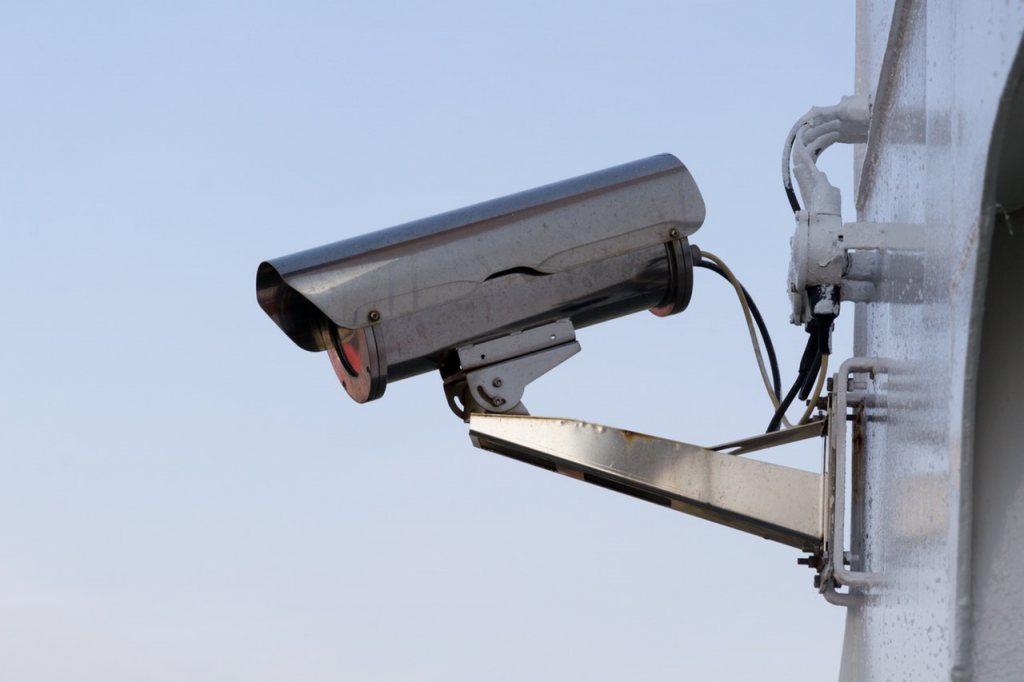
Your home security cameras need to give a good overview of your property. Some 40% of burglars enter homes through unlocked doors while 35% break a door or window.
So at a minimum, it’s best to have a security camera by your front and back doors. You may want to consider installing security cameras on street-facing windows.
Other places to install your cameras include down the driveway, over the garage, or even on the second floor to give you an elevated view of your property.
To get the most out of your security system, and to make your home as safe as possible, it’s best to enlist the help of a specialist to advise you on placement and to carry out the actual installation.
How Much Does Home Security Cost?
The cost of a home security system varies depending on what you buy, the size of your home, your needs, and other factors.
In all likelihood, it will be a solid investment if you want to get your money’s worth.
Starter kits are your budget option, costing around $400. A fully wireless alarm system with 24/7 back-to-base monitoring (where a security company responds to an alarm) may be more than $2,500.
Some home security systems require an ongoing subscription fee for monitoring services. But this could be as little as $2 a day.
Of course, there is more to think about than the outright cost of a home security system. You’ll want to factor in any available discounts insurance companies offer on home and contents insurance premiums when you have an alarm system.. And of course, if it saves you from being burgled, it’s a solid investment.
Recommended reading:
- The Australian Security Industry Association Ltd provides a great overview of the tech required to ensure home security and safety, from locking systems to fire detectors and more.
- Budget Direct dishes out all the up-to-date stats on home burglaries in Australia in 2019.
- RACV provides a brilliant crime map of Victoria, where you can check burglary rates by postcode.
Smart Homes: The Future of Home Security
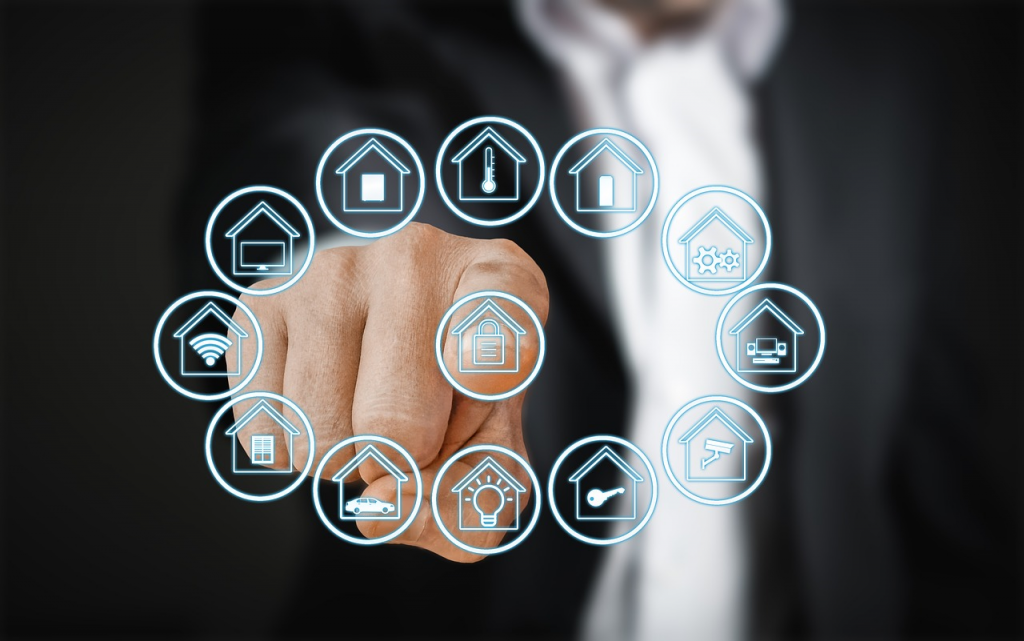
Here at Hit The Switch, we’re pumped about the future of home security and safety. Once upon a time, home security systems amounted to barking dogs (still an effective deterrent) and manual chimes over the doors. Then came CCTV home security.
Today we’re looking at a whole new and exciting landscape for home security. Something you would expect from Back to the Future.
Innovative technology has sent us on the path to home automation, which is revolutionising the way we protect our properties.
Cameras come enabled with facial recognition and automatic face profiling. Keyless entry, garage door controls, smart locks, lighting, and surveillance footage can all be accessible on your smartphone.
Your phone can alert you when you have a visitor. You can use it to see who that visitor is. If you’re across town, you can give them access into your home. And if your home security system picks up unusual activity, you can receive alerts and decide how to act.
And what about home security for apartments?
Roving robots are right around the corner. In fact, they already exist in some apartment complexes. They act as an extra pair of eyes, offering a 360-degree view during their 24/7 patrols. They can even serve as a loudspeaker if needed.
Meanwhile, sophisticated camera systems give apartment residents greater control, moving video intercom communications to their mobile phones.
Smart access systems on the building’s front door give tenants the ability to use their phones as video intercoms.
Tenants don’t need to search for a key or key in a passcode. The intercom recognises their phones and automatically opens their front door for them, even if the phone is still buried deep in a bag or a pocket.
Tenants can even create and send access codes to guests for temporary access into the building or buzz them into the building using their phones.
Recommended reading:
- The Hardware Journal summarises the four emerging market trends for home security systems. (The original Technavio report is a hefty US$2500).
- The New York Times describes the changing landscape for apartment complex security.
- Forbes predicts 14 key trends for smart home technology now and in the future.
Secure your home for your family. Contact a qualified electrician to conduct a home electrical inspection. Fairer. Better. And right the first time.
How to locate an electrical fault… quickly and safely
Home electrical fault finding guide – common electrical problems solved!
